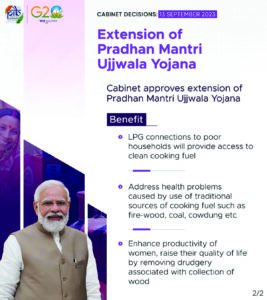The Union Cabinet, chaired by the Prime Minister Shri Narendra Modi on 13 September approved the extension of Pradhan Mantri Ujjwala Yojana (PMUY) for release of 75 lakh LPG connections over three years from Financial Year 2023-24 to 2025-26. Provisioning of 75 lakh additional Ujjwala connections will take total number of PMUY beneficiaries to 10.35 crore.
According to the World Health Organization (WHO), approximately 2.4 billion people worldwide (which is around one-third of the global population), rely on open fires or inefficient stoves fuelled by kerosene, biomass (such as wood, animal dung, and crop waste), and coal for cooking. This leads to harmful household air pollution, contributing to an estimated 3.2 million deaths annually in 2020, with over 237,000 deaths being children under the age of 5. Achieving a sustainable and pollution-free future requires addressing the issue of household air pollution, especially to prevent suffering among women and children.
In the past, impoverished communities in India, particularly in rural areas, used traditional fuels like firewood, coal and dung cakes without being aware of the adverse health effects caused by them. Consequently, they faced health problems without knowing the underlying cause. A heightened mortality risk due to illnesses such as pneumonia, lung cancer, ischaemic heart, and chronic obstructive pulmonary diseases is extensively reported. Non-renewable wood fuels for cooking cause a gigaton of CO2 emissions, and burning residential solid fuels comprise 58 percent of black carbon emissions. They are also a significant contributor to household air pollution (HAP) due to incomplete combustion of solid biomass.
Research also indicates that this is a gender problem: girls and women face increased exposure to solid fuels. Cooking with solid fuels delays progress towards five of the UN Sustainable

The PMUY scheme has empowered women economically and socially. With easier access to LPG, women are no longer burdened with the task of collecting firewood or other traditional fuels, which often required long and laborious journeys. This newfound convenience allows them to participate more actively in community life and take up other income-generating opportunities.
Furthermore, the Ujjwala scheme has contributed to enhancing the safety and security of women, as they no longer need to venture into isolated and potentially unsafe areas to collect firewood or fuel.


